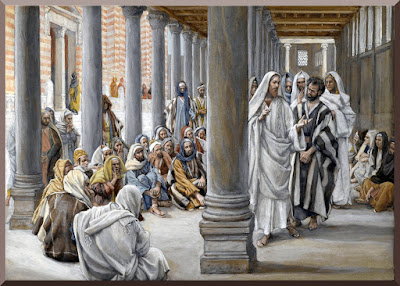I HAVE PREPARED MY CASE. I KNOW I WILL BE VINDICATED
From the storm
God storms into Job’s presence. Now, it’s my turn, he
says. I will cross-examine you.
Throughout the dialogues between Job and his friends, Job
especially, had claimed vast knowledge of the way things work — or should work
— in this world. Job said of a hoped-for encounter with God, "I have
prepared my case, I know I will be vindicated" (Job 13:18).
Now, out of the raging storm, God begins to challenge
Job’s claim to understanding: "Who is this that darkens my counsel with
words without knowledge?" (Job 38:2).
From the whirlwind, God demands of Job, "Will the
one who contends with the Almighty correct him?" (Job 40:2). God tells Job
he doesn’t know what he’s talking about when he questions God’s fairness.
He isn’t going to answer any of Job’s "Why?"
questions. God has come to cross-examine. "I will question you, and you
shall answer me," he tells Job twice (Job 38:3; 40:7).
How does God answer Job? He sidesteps every question Job
had. Instead, God gives Job a wilderness appreciation tour, recounting the
majesties of nature from hail to horses (Job 38:22; 39:19). Is this relevant?
Indeed, it is.
Aaagh! How stupid
I was, thinks Job. He smacks his brow and puts his hand to his mouth. Job
finally understands the error of his hasty conclusion (Job 40:4). He grasps
that his position is built on ignorance. He realizes God is quite capable of
running the universe correctly.
A bigger God
Job now knows that whatever has happened to him — in some
way he can’t fully understand — will work out for his benefit, for everyone’s
benefit (see Romans 8:28). Job can say to God, "I know that you can do all
things; no plan of yours can be thwarted" (Job 42:2).
Job is now convinced of God’s infinite wisdom in dealing
with him as he sees fit. Job now knows there is a purpose for his suffering —
God’s purpose. That is quite enough for him. The mighty voice of God thundering
out of the whirlwind puts everything into perspective for Job. It says: God is
alive; God is here; God cares; God is capable.
Job has been given an answer, not the one he expected,
but one much more important. No matter that he had not been given a chance to
present his own case. When God appears, Job’s questions melt away precisely
because God has now revealed himself.
Surprisingly, God does not condemn Job for railing
against him and accusing him. God only corrects Job’s misconception about his
ability to rule the creation.
To be sure, God reprimands Job because Job condemned him
for injustice. Out of the storm, God batters Job with these questions:
"Would you discredit my justice? Would you condemn me to justify
yourself" (Job 40:8)? But God does not accuse Job of sin. God neither
calls him self-righteous nor a blasphemer. …to be cont’d
In Christ,
Playwright Janet Irene Thomas
Founder/CEO
Bible Stories Theatre of
Fine & Performing Arts
God won’t condemn
Does this mean that we might also dare express our
frustration, our anger — even call God to account in our ignorance and
confusion — without being condemned by God? Shocking though it may be — yes, we
can.
In Philip Yancey’s words: "One bold message in the
Book of Job is that you can say anything to God. Throw at him your grief, your
anger, your doubt, your bitterness, your betrayal, your disappointment — he can
absorb them all." God is much bigger than we are.
Job also recognizes how big, how great, God is. After
hearing God’s argument, Job says, "I despise myself and repent in dust and
ashes" (Job 42:6). But repent of what? Of some specific sin? Not quite.
Job explains, "Surely I spoke of things I did not understand, things too
wonderful for me to know" (verse 3).
It wasn’t that Job had to overcome a specific sin, but
rather that he had to grow in understanding. Job had been too hasty in
concluding God was unjust or inept.
Job now had a deeper, clearer perception of his Creator.
But this new awareness was only a by-product of the real purpose of Job’s
suffering — the testing of his faith and love. In this case, God needed to know
something about Job, and Job needed to know something about himself and about
God.
The why of suffering
The book of Job, then, teaches us that suffering may
occur for reasons we don’t understand unless or until God reveals them to us
(see John 9:1-7, for example). Trials may come because God needs to know
something about a faithful servant (Genesis 22:1-12). Job’s suffering had such
an intent — to prove whether he would love God despite everything.
This message of Job has deep implications for the
Christian’s relationship with God. Trials and suffering provide spiritual
enrichment and build a relationship between us and God (2 Corinthians 12:7-10;
Hebrews 12:4-12; James 1:2-4; 1 Peter 4:12-19).
Job also tells us no ironclad relationship exists between
suffering and sin. Just because Christians suffer trials or tragedies does not
mean God is punishing them for some sin.
The book of Job is about much more than suffering or
God’s justice. Job affirmed that God was still God — no matter what — and
always worthy of our love, reverence and worship. That was the test on Job, and
he passed it. He vindicated both himself and God by remaining faithful. Job proved
it is possible for humans to love God unconditionally.
Suffering had been an expansive, faith-demonstrating
opportunity for Job. God had grown much bigger; Job had become smaller.
In Christ,
Playwright Janet Irene Thomas
Founder/CEO
Bible Stories Theatre of
Fine & Performing Arts






















